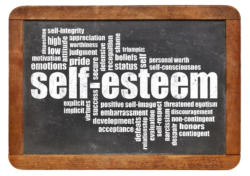
How are you feeling about yourself today? Many of us experience a daily roller coaster of the highs and lows of self-esteem and self-worth. How we feel about ourselves may change on any given day, depending on an interaction with our spouse, child, co-worker or friend. Our feelings of worth and success may vary dramatically depending on the number on the scale or the amount of money in our bank account. We may struggle with our self esteem for days, weeks, or months at a time, if we have experienced a recent conflict, crisis or loss. Those days can feel very dark and full of doubt and judgement.
From a very young age, many of us are taught that high self-esteem is important. As children, we are encouraged to do our very best in every activity, whether it be school, sports or the role we play in our families or other relationships. This mindset carries on into adulthood. We should be confident in all our endeavors and if we fall down, then we should get back up, shake it off and keep going. But what about the days we just can’t shake it?
The answer is self-compassion. This concept was developed by Dr. Kristin Neff, PhD. Her book, Self Compassion, is an excellent resource about this topic. Dr. Neff breaks down self-compassion into three parts. First, self-kindness. Even when we are struggling to find our purpose and worth, we can be kind to ourselves and give ourselves whatever we need and deserve. If we are having a bad day, we may not be able to change our circumstances, but we can make a choice to be kind to ourselves. Self-kindness may be having a cup of tea, taking a bath, enjoying a sunset or allowing ourselves just to sit and be still. Secondly, self-compassion also recognizes common humanity. We are not alone. We have all struggled and suffered in one way or another. We can stop comparing ourselves to others and we don’t have to feel like we are the only ones that have ever experienced a hardship. It is easier to get through obstacles when we know we are not alone in our journey. Lastly, Dr. Neff encourages mindfulness. In practicing mindfulness, we focus less on critiquing our negative thoughts, feelings and experiences. Instead of pushing those sad, angry or guilty feelings away, we can simply observe them without judgement.
Self-compassion is a gift you can give yourself today. You don’t have to change your circumstances or mindset to embrace it. You will feel better if you offer yourself compassion instead of judging yourself for feeling depressed, anxious or hopeless. At Isaiah Counseling & Wellness, our therapists can help you explore these inner thoughts. I welcome the opportunity to work with you and help you discover your own self-compassion.


